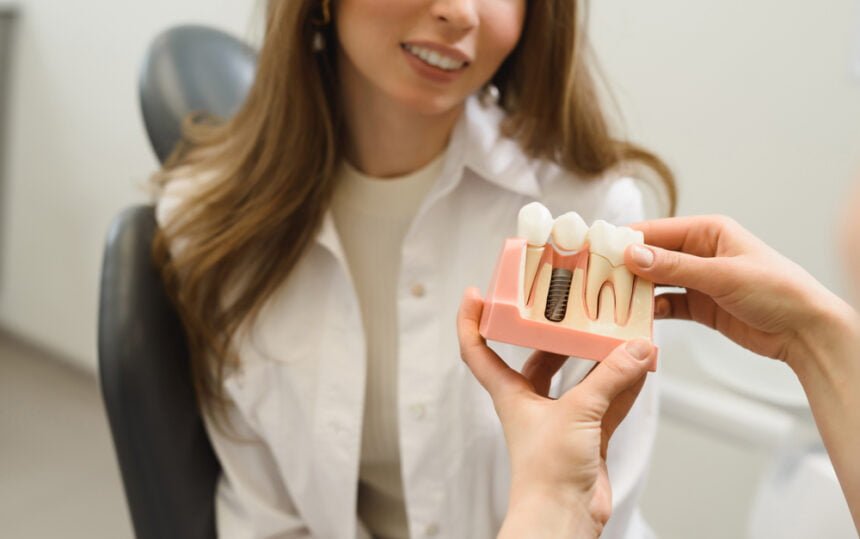Despite its increasing popularity in Australia primarily for its natural aesthetic value and long-term durability, the dental implant procedure carries a cost that is a significant obstacle for a substantial proportion of Australians.
This article aims to offer readers a detailed financial insight through an extensive cost analysis of dental implants in Australia. Read more!
What Are Dental Implants?
Dental implants, artificial tooth roots designed to echo the shape and function of screws, serve as a robust and permanent solution for replacing missing teeth. It will be meticulously carried out by specialists like Radiant Smiles Dental Care, who ensure these implants are competently inserted into the jawbone to bond with the natural bone.
This creates a robust foundation to support artificial teeth, known as crowns. Dental implants offer superior longevity and feel more natural than tooth replacement solutions such as dentures and bridges.
Cost Factors of Dental Implants
The cost of a dental implant procedure in Australia can vary significantly due to the following factors:
- Type of dental implant: Different types of dental implants come with different characteristics and price tags. For example, endosteal implants (implanted directly into the jawbone) can be more expensive than subperiosteal implants (on or above the jawbone).
- Number of implants needed: Cost tends to increase proportionally with the required number.
- Material used: Implants can be made from various materials — typically titanium or zirconia, with the latter typically more expensive.
- Geographical location: The cost of living and operation (including rent, wages, and competition) in a geographical area can increase dental implants’ cost. For instance, metropolitan areas like Sydney and Melbourne may charge higher than smaller towns.
- Surgeon’s experience and reputation: The expertise level of the dental surgeon can also significantly influence the costs. More experienced and well-established surgeons will likely charge a premium for their services.
The Average Cost of Dental Implants in Australia
While the exact cost for dental implants can vary significantly, depending on the factors mentioned above, it’s safe to say that dental implants don’t come cheap. Here’s a ballpark range:
- Single dental implant: The cost for a single dental implant in Australia typically ranges from $2850 to $6500. This includes the surgery for the placement of an implant, all the components, and the implant crown.
- Multiple dental implants: For multiple tooth implants, the costs can range between $15000 and $30000, or even more, depending upon the complexity of the case.
- Full-mouth dental implants: Full-mouth dental implants can cost anywhere from $30000 to $60000, potentially going even higher.
It’s important to remember that these figures represent the “average” costs — the final price tag of your dental implants could fall outside these ranges.
Government Assistance Programs
Specific individuals may be eligible for government subsidies, such as those under the Child Dental Benefits Schedule (CDBS) and the Department of Veterans’ Affairs (DVA) Gold Card. CDBS provides up to $1,000 over two calendar years for essential dental services for children aged 2–17. Meanwhile, the DVA offers funding for eligible veterans.
Insurance Coverage and Payment Plans
Most dental insurance plans do not typically cover dental implants as they categorize them as cosmetic. However, some policies could cover part of the costs, such as the crown, so checking with your insurance provider is useful.
Furthermore, specific dental clinics offer payment plans enabling patients to pay off their treatment over a set period. This can make dental implants more financially achievable for some individuals.
Additional Procedures That May Affect Cost
Additional procedures may be necessary for some patients before dental implant surgery, affecting overall cost. These procedures are conducted to ensure optimal results and may include:
- Bone grafting: In instances of insufficient jawbone to support the implant, bone grafting may be necessary to create a solid foundation for the dental implant. Bone grafting procedures can cost from $200 to $3,000, depending on the graft’s size and complexity.
- Sinus lift: A sinus lift may be required for upper jaw implants where the sinuses are too close to the jaw for safe implant placement. Sinus lifts can vary in cost from $1,000 to $3,000.
- Tooth extraction: If a damaged or decayed tooth needs to be removed before the implant procedure, the extraction’s cost will factor into the total expenses. Tooth extraction costs can range from $150 to $650 per tooth, depending on the complexity of the extraction.
How to Choose a Dental Implant Provider
Selecting a dental implant provider is a crucial decision that can impact both the success of the implant procedure and the total cost incurred. When looking for a reliable provider, consider the following:
- Expertise and qualifications: Assess the provider’s qualifications, including their dental education, professional certifications, and accreditations. The provider should have specific training and experience in dental implant procedures.
- Reviews and testimonials: Seek recommendations from friends or family who have undergone dental implant treatment and consult online reviews to gauge patient satisfaction.
- Proximity: Choosing a provider near your residence can result in convenience and potential savings on travel costs.
- Cost transparency: Ensure that your dental implant provider is upfront about costs and willing to walk you through all associated expenses.
- Treatment plan: Your provider should be flexible and tailor their treatment plan to your needs and preferences.
Final Thoughts
Although costly, dental implants offer a long-lasting and reliable solution to tooth loss, likely explaining why many Australians still opt for this treatment. It’s crucial to discuss possible costs with your dental healthcare provider to ensure you’re informed and can plan your finances accordingly.
Remember, while cheaper rates may be tempting, quality and expert care should never be compromised for cost.

